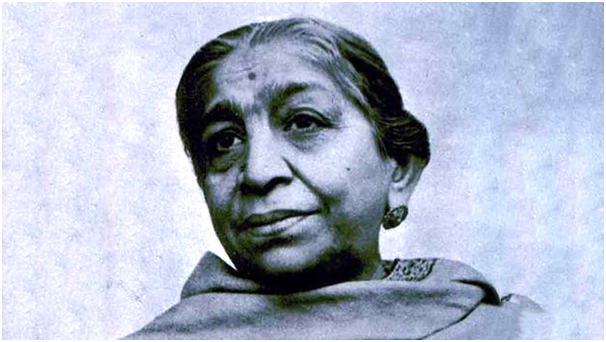news details |
|
|
| Sarojini Naidu: Poetess, Icon of freedom quest | | “A country’s greatness lies in its undying ideas of love and sacrifice that inspire the mothers of race.” | |  Sarojini Naidu Sarojini Naidu
Sarojini Naidu was an Indian Political activist and poet, a proponent of civil rights, women’s emancipation and anti-imperialistic ideas. She was an important figure in India’s struggle for independence from colonial rule. She was born on February, 13 1879. She was the eldest daughter of Aghoranath Chattopadhyay, a Bengali Brahmin who was Principal of Nizam College. A brilliant student, Sarojini received accolades galore when she was admitted to the Madras University aged just 12. India celebrates Sarojini Naidu’s birthday as National women’s day every year on Feb 13.
After passing matriculation, she took a break for four years and qualified for a scholarship to study abroad. In 1895, she joined King’s college, London and later Girton College in Cambridge. During this period, she developed a passion for reading and writing poems. She also achieved proficiency in several languages including Urdu, Persian and Telegu. While in college, Sarojini Chattopadhya met Govindarajulu Naidu. After she completed studies at the age of 19, the duo got married in 1898 and later had four children.
Sarojini Naidu actively participated in the freedom movement which she joined after the partition of Bengal. During 1915-1918, she travelled whole country addressing gatherings on themes such as nationalism, social welfare, women empowerment and emancipation. She was closely associated with all the leading lights of the freedom movement including Gopal Krishna Gokhale, Rabrindranath Tagore, Mohammed Ali Jinnah, Annie Besant, C.P Ramaswami Iyer, Mahatma Gandhi and Jawahar Lal Nehru.
In 1925, she was appointed the President of the National Congress, making her the first Indian women and second one overall (after Annie Besant) to occupy the post. In 1930, she participated in the Salt Satyagraha, presided over the East African Indian Congress and in 1931; she attended the second round table Summit with Gandhiji and Madan Mohan Malaviya.
The British colonial authorities punished Naidu by sentencing her to prison stunts in 1930, 1932 and 1942-43. In 1942, she was arrested along with Gandhiji for her involvement in the Quit India Movement and was jailed for almost 2 years. She led a example and inspired a large number of women to come forward and take part in the Freedom Struggle.
Sarojini Naidu played an important role in women’s rights struggle in India. She helped in shaping Women’s Indian Association in 1917 with Annie Besant and others. The Association sought equal rights including the right to vote and represent. She presented the need to include more women in the Congress and in the freedom struggle. During 1918, British and Indian feminists including Naidu set up a magazine called “Stri Dharma” to present international news from a feminist perspective.
As a prolific poet, the first volume of her poems titled “The Golden Thresholds” was published in 1905, which was followed by the collections titled “The Bird of Time” and “The Broken wing”. Her poetic works received critical acclaim and rare reviews all over England. Her great poems and lyrical abilities urged Mahatma Gandhi to give her title of the Nightingale of India.
She wrote verses for children as well as grown-ups and her themes ranged from nature and its beauty, patriotism, love and death. Even at time when religious tensions ran high, she penned down a poem that praised Muslim religious figures. Her poetry reflected her deepest emotions and an outlook that was aimed at transcending social divisions such as caste, class and religion. For her contributions in fighting the Plague epidemic, she was conferred the Keiser-i-Hind medal by the British government.
In 2018, she was among the 150 leading women featured by the University of London to mark the 150 years since women gained access to higher education in the UK in 1868.
Sarojini Naidu lived a life by her own words, “As long as I have life, as long as Blood flows through this arm of mine, I shall not leave the cause of freedom. I am only a woman, only a poet, but as a woman, i gave you the weapons of Faith, Courage and shield of Fortitude. And as a poet, I flung out the banner of song and sound, the bugle call to battle. Her perseverance and sentiments towards the freedom movement and the flag moved members of the assembly to elect her as a person to present the first flag of India to Dr Rajender Prashad, the President of India. However, Naidu was travelling during that time and therefore; the flag was instead presented by Hans Jivaraj Mehta. Leading the country, especially the women to liberation, Naidu continued to hold prominent position post independence as well. She was appointed the first Governor of the United Provinces now Uttar Pradesh and remained in office until her death March 2, 1949. |
|
|
|
|
|
|
|
|
|
|
|
|
| |
| |
|
|
|
|
 |
|
|
